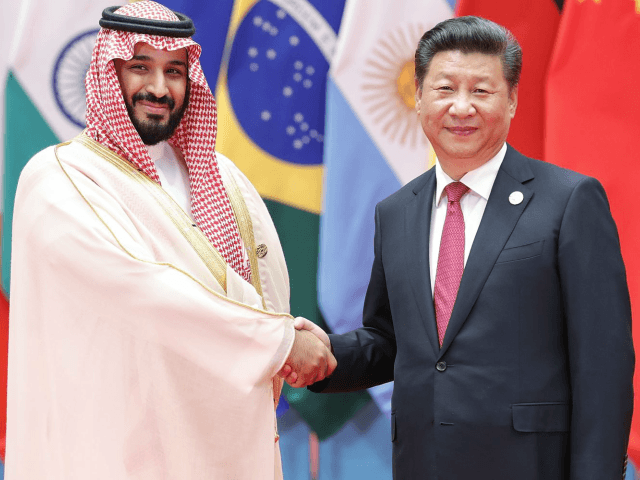Saudi Crown Prince Mohammed bin Salman (MBS) met with Chinese Communist Party leader Xi Jinping at the Great Hall of the People in Beijing on Friday, capping a tour of Asia that was widely seen as the Saudis “pivoting to the East” after losing Western friends over the murder of Jamal Khashoggi. MBS also visited India and Pakistan on his way to China.
“Is the crown prince’s tour symbolic of Saudi Arabia’s pivot to the East? Yes,” Najah al-Otaibi of the Arabia Foundation said in an interview with AFP.
“Riyadh wants to strengthen alliances in Asia, especially now with the continuing fallout with the United States over Khashoggi’s murder and other issues and attempts by the EU to put Riyadh on a blacklist over money laundering allegations,” Otaibi said.
China’s state-run Global Times was on the same page, although it argued the Saudi “Look East” policy is about more than just looking for new sources of political and economic support after the Khashoggi murder:
Because of oil, the Middle East became the world’s geopolitical center. Saudi Arabia and other countries in the region traded oil for security with Western countries. Afterward, turbulence triggered terrorism in the region. The US and Europe bought less oil from the Middle East because of their own progress in energy technology. Conflicts in the Muslim world were long-term and complicated.
The Khashoggi case caused a serious row, as the US and other Western countries accused their biggest ally in the Gulf of violating human rights. In the past, these countries couldn’t live without Saudi Arabia’s oil. But now they believe they have more initiative in relations with Saudi Arabia. Buying its oil or not, selling weapons to it or not, these can be Western countries’ tools to adjust relations with Saudi Arabia.
Saudi Arabia is still dependent on the US for security. The relationship with the West is still important to the country. But it needs to diversify its strategic cooperation. With or without the Khashoggi case, the Arab country needs to look east.
The Global Times essentially viewed the Khashoggi debacle as the triggering event for a Saudi realignment that was inevitable anyway, as China remains the kingdom’s top oil customer while the U.S. is increasingly less dependent on Saudi oil.
A report from the state-run Xinhua news network on Friday quoted Chinese Vice Premier Han Zheng, who also met with MBS, calling on China and Saudi Arabia to “strengthen the synergy of the Belt and Road initiative and Saudi Vision 2030.”
Belt and Road is China’s trillion-dollar international infrastructure/colonialism plan, while Saudi Vision 2030 is a plan for diversifying the Saudi economy away from its dependence on oil, formulated under MBS’ leadership before he became crown prince.
Chinese media reported the Saudi crown prince responding positively to Han’s suggestions for deeper energy, infrastructure, finance, and tech cooperation. The Saudi government on Friday announced a joint venture worth over $10 billion to develop a petrochemical refinery in China’s Liaoning province, plus 35 memorandums of understanding for joint projects covering mineral resources, transportation, e-commerce, and other fields. The refinery will be capable of processing 300,000 barrels of crude oil per day and producing a million tonnes per year of useful petrochemicals.
According to Xinhua, MBS expressed opposition to “interference by external forces in China’s internal affairs,” which is Chinese code for telling the international community to stop complaining about China’s oppression of the Uighur Muslims, Christians, and other religious and ethnic minorities.
“Saudi Arabia’s relations with China can be traced back a very long time in the past,” MBS said after meeting with Xi. “Over such long periods of exchanges with China, we have never experienced any problems.”
“China is a good friend and a partner to Saudi Arabia,” Xi responded.
The diplomatic situation is complicated since China is also pursuing close relations with Saudi Arabia’s arch-enemy Iran. Before reaching Beijing, MBS and his high-level entourage visited with India and Pakistan, two countries that seem to be teetering even closer to the brink of war than usual these days. MBS hoped to serve as an intermediary between India and Pakistan, which would please China and further its Belt and Road interests; perhaps the Saudi crown prince hopes China can exert pressure on Iran in a few key areas to make the Middle East safer for Belt and Road.
Whatever his intentions, the actual results of MBS’ Asian tour have not included much in the way of a rapprochement between India and Pakistan. Some Indians are disgruntled that Prime Minister Narendra Modi did not lean harder on MBS to express his support for India’s side of the current Kashmir crisis. The Pakistanis saluted Mohammed bin Salman’s efforts as a peacemaker by giving him a gold-plated machine gun, and he reciprocated by signing $20 billion worth of deals with Islamabad, to the annoyance of India and the likely dismay of Iran.
The result of MBS’ trip to Asia could be Pakistan shifting away from Iran into Saudi Arabia’s orbit, while India furiously accuses China and Saudi Arabia of protecting terrorists in Kashmir by reinforcing Pakistan’s confidence that it doesn’t have to go after them. It will be interesting to see what Beijing thinks of this reshuffling of Middle Eastern cards with billions of dollars, China’s oil supply, and the fate of Belt and Road in the ante.

COMMENTS
Please let us know if you're having issues with commenting.